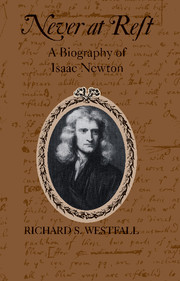Book contents
- Frontmatter
- Contents
- Preface to the paperback edition
- Preface
- Acknowledgments
- A note about dates
- Abbreviations used in footnotes
- 1 The discovery of a new world
- 2 A sober, silent, thinking lad
- 3 The solitary scholar
- 4 Resolving problems by motion
- 5 Anni mirabiles
- 6 Lucasian professor
- 7 Publication and crisis
- 8 Rebellion
- 9 Years of silence
- 10 Principia
- 11 Revolution
- 12 The Mint
- 13 President of the Royal Society
- 14 The priority dispute
- 15 Years of decline
- Bibliographical essay
- List of illustrations
- Index
- General index
13 - President of the Royal Society
Published online by Cambridge University Press: 05 June 2013
- Frontmatter
- Contents
- Preface to the paperback edition
- Preface
- Acknowledgments
- A note about dates
- Abbreviations used in footnotes
- 1 The discovery of a new world
- 2 A sober, silent, thinking lad
- 3 The solitary scholar
- 4 Resolving problems by motion
- 5 Anni mirabiles
- 6 Lucasian professor
- 7 Publication and crisis
- 8 Rebellion
- 9 Years of silence
- 10 Principia
- 11 Revolution
- 12 The Mint
- 13 President of the Royal Society
- 14 The priority dispute
- 15 Years of decline
- Bibliographical essay
- List of illustrations
- Index
- General index
Summary
THE Royal Society, to which Newton had dedicated his Principia in 1687 only to ignore it steadfastly when he moved to London, stood at a low ebb during the early years of his residence in the capital city. Membership, which had reached more than two hundred in the early years of the 1670s, now scarcely numbered more than half that figure, and few of the members attended the weekly meetings. In light of what the minutes indicate about the meetings, one cannot blame them for not attending. Unplanned and unstructured, given over mostly to miscellaneous chit-chat devoid of serious scientific interest, the meetings suggested little of the interests that had brought the society together forty years earlier. In 1699, a concerned council gave thought to stimulate members to perform experiments at meetings. On 8 March, they drew up a list of thirty-eight members (including “Mr. Newtoun”) who might be charged with that function, and a week later seventeen of them (“Mr. Newtoun” not included) showed up at the council and promised to undertake the obligation. The following week, some of the seventeen suggested that the council pay them £5 per year for their pains.
The flurry of interest died out as quickly as it had arisen, however, and later that spring Mr. Van de Bemde's remark “yt cows piss drank to about a pint, will either purge or vomit with great Ease,” led to an all-too-typical discussion of the medicinal value of bovine urine.
- Type
- Chapter
- Information
- Never at RestA Biography of Isaac Newton, pp. 627 - 697Publisher: Cambridge University PressPrint publication year: 1981



